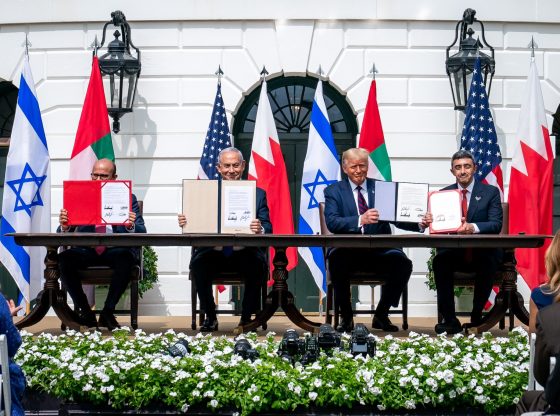In a historic moment, Israeli Prime Minister Benjamin Netanyahu met with Saudi Arabia’s Crown Prince Mohammed bin Salman in Saudi Arabia over the weekend. The meeting between the two world leaders marks the first publicly acknowledged meeting between a prime minister of the Israeli government and a high ranking Saudi government official.
#BREAKING: Israel PM Netanyahu and head of the Mossad flew yesterday to Saudi Arabia, and Met Pompeo and MBS in the city of Neom, according to Israeli officials
— Amichai Stein (@AmichaiStein1) November 23, 2020
The meeting attended by United States Secretary of State Mike Pompeo and Israeli Mossad chief Yossi Cohen marks the latest development in the push to normalize relations with Israel. President Trump has received multiple Nobel Peace Prize nominations for his work to push Gulf states to strengthen relations with Israel and join in efforts to counter Iran, which is viewed as the single biggest threat to peace in the Middle East. The Trump administration pulled out of the Iran nuclear deal and shifted focus towards boosting peace between Israel and its neighboring. The decisions of Sudan, Bahrain, and the UAE to join the historic Abraham Peace Accords marks a historic shift for the Middle East.
Some see the move to publicize the meeting between Netanyahu and Salman as a carefully timed political tactic to show Iran a semblance of unity between the nations. Joe Biden has left the distinct impression that he will seriously consider rejoining the dangerous Iran nuclear deal, calling Trump’s decision to leave the deal “reckless.”
In a report from The Daily Wire:
In 2015, while Barack Obama was still in office, over 214 former generals and admirals signed an open letter to Congress warning that the Iran nuclear deal could bring war and was unverifiable. They wrote:
There is no credibility within JCPOA’s inspection process or the ability to snap back sanctions once lifted, should Iran violate the agreement. … The agreement as constructed does not “cut off every pathway” for Iran to acquire nuclear weapons. To the contrary, it actually provides Iran with a legitimate path by doing that simply by abiding by the deal. … The agreement is unverifiable.Under the terms of the JCPOA and a secret side deal (to which the United States is not privy), the International Atomic Energy Agency (IEAE) will be responsible for inspections under such severe limitations as to prevent them from reliably detecting Iranian cheating. … These inspections do not allow access to Iranian military facilities, the most likely location of their nuclear weapons development efforts.
In 2017, former UN ambassador John Bolton and former undersecretary of State for arms control and international security affairs Paula A. DeSutter, defending President Trump’s actions vis-à-vis Iran, wrote that the Iran nuclear deal was “inherently unverifiable,” noting:
In critical respects, President Obama negotiated the JCPOA to be inherently unverifiable. The vaguely written and internally contradictory text of the agreement, with language invariably favorable to Iranian interpretations that would subvert its ostensible intent, is the opposite of how arms agreements should be written. This is no surprise, because a verifiable nuclear agreement was not what Mr. Obama wanted. Instead, he sought a political agreement with Tehran that would neither require Senate approval nor be easily terminated by subsequent administrations. Given that objective, a tightly written, readily verifiable agreement with which Iran never had any intention of complying would have been an obstacle rather than an aid.
It’s clear that the Middle East is bracing for the impact of a Biden administration and the threat it imposes on peace in the region.











